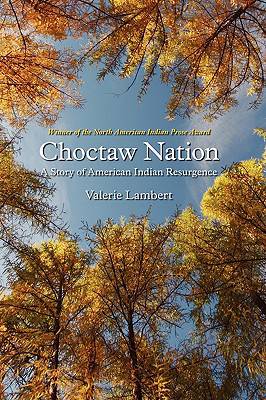
- Retrait gratuit dans votre magasin Club
- 7.000.000 titres dans notre catalogue
- Payer en toute sécurité
- Toujours un magasin près de chez vous
- Retrait gratuit dans votre magasin Club
- 7.000.0000 titres dans notre catalogue
- Payer en toute sécurité
- Toujours un magasin près de chez vous
Description
Choctaw Nation is a story of tribal nation building in the modern era. Valerie Lambert treats nation-building projects as nothing new to the Choctaws of southeastern Oklahoma, who have responded to a number of hard-hitting assaults on Choctaw sovereignty and nationhood by rebuilding their tribal nation. Drawing on field research, oral histories, and archival sources, Lambert explores the struggles and triumphs of a tribe building a new government and launching an ambitious program of economic development in the late twentieth century, achieving a partial restoration of the tribe's former glory as a significant political and economic presence in what is now the United States. An enrolled citizen of the Choctaw Nation who was reared in Oklahoma, Lambert describes in vivid detail what this nation building has meant for the Choctaw people and for non-Indians. Choctaw nation building has strengthened the tribe's ongoing efforts to defend their sovereignty and protect their rights to land, water, and other natural resources. It has also helped produce new ways of imagining, constructing, and expressing Choctaw identity. Yet, as Choctaw Nation also shows, Choctaw sovereignty--the bedrock of Choctaw empowerment--remains under threat, as tribal sovereignty is not only a bundle of inherent rights but also an ongoing, complex consequence of Native initiatives and negotiations on local, state, and national levels. In addition to wrestling with the topics of sovereignty, identity, tribal nationalism, and contemporary tribal governance, this book gives considerable ethnographic attention to tribal elections, non-Indians, urban Indians, economic development, and tribal water rights.
Spécifications
Parties prenantes
- Auteur(s) :
- Editeur:
Contenu
- Nombre de pages :
- 320
- Langue:
- Anglais
- Collection :
Caractéristiques
- EAN:
- 9780803224902
- Date de parution :
- 20-03-09
- Format:
- Livre broché
- Format numérique:
- Trade paperback (VS)
- Dimensions :
- 152 mm x 229 mm
- Poids :
- 471 g

Les avis
Nous publions uniquement les avis qui respectent les conditions requises. Consultez nos conditions pour les avis.






